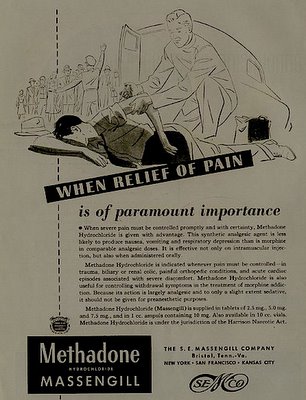Lesson Learned
 Medics have been called.
Medics have been called.
Except there weren't medics in the '50s, and this guy in white is injecting Methadone on scene.
The patient obviously didn't faint because he has the famous "head in crook of arm" sign. There is a police officer holding off the hordes in the background, but no sign of an MVA. And guy-in-white doesn't seem to be too concerned about C-spines. Good info on methadone in the ad, though.
But wait!
Massengill?
Don't they make douches?
A methadone douche?
Ladies, would YOU want to feel fresh as a daisy all day with a narcotic, anesthetic douche?
Doesn't that sort of, to put it gently, defeat the purpose?
You'd feel fresh all day but you'd be too stoned to care!
People often run into our emergency department in a panic, bringing with them a friend who is exhibiting an altered level of conciousness.
The patients are usually female, underage and intoxicated. The petite ones get carried in, others are placed in a wheelchair and are observed to be slumped over on arrival.
They arrive with a bevy of friends who were at the same function and are scared to death; so scared that someone has actually called the parents.
We make sure the airway is protected, do a tox screen to make sure that we are only dealing with ETOH, hydrate the patient and when they can ambulate, we discharge them and leave further "treatment" to the parents.
(It's a good time to give some education to the friends regarding alcohol consumption, too. They tend to be rather receptive when they are truly afraid a peer is dying.)
hhhhhhhhhhhhh
This time was different.
A gentleman informed the desk that he needed a wheelchair for his daughter, who was not feeling well. He had been called to come and get her from a party. I took the wheelchair out to the parking lot and the woman (she was in her early 20s) ambulated steadily to the chair. Hmmm....they don't usually do that.
She was slow but oriented to person and place, warm, dry and denied any medical problems. No allergies. Her vitals were OK, except for a slightly elevated respiratory rate. She was a bit "glassy-eyed", and occasionally I had to get her to look at me. The main thing was she took forever to answer a question and moved like an old VCR tape in slo-mo.
She also had a flat affect, just barely emoting enough to get angry when I asked her, for the third time, what drugs she was on. Or how much alcohol she had been drinking.
None.
"You are not acting normal," I said. "And I am concerned." That's when Dad broke in with this rather startling piece of information:
"She is drinking tons of water and Diet Pepsi and she always seems to be in the bathroom."
Oh no.....
I could have grabbed a finger-stick glucose level in triage but all of a sudden I knew what I was dealing with.
Hyperglycemia. New onset diabetic.
We grabbed a room, called the doc, took a finger-stick glucose that just read "High". As well it should; the actual lab glucose was over 1000.
Normal for our lab is around 70-110.
Had this patient been alone, without other people to notice her mental alteration, she would have gone into a diabetic coma. She would have died.
She didn't. We admitted her and she was discharged a few days later, with a life that had been radically altered in terms of lifestyle and responsibility for her own wellbeing.
I once watched a 25-year-old die of new-onset diabetes when I worked in ICU.
I felt abashed. For the arrogance of assuming her altered state was drugs or alcohol. For not believing her when she denied both. For not picking up on the elevated respiratory rate. For not getting an immediate fingerstick in triage on an "altered" patient.
For having to be reminded that in emergency nursing, no patient is "routine".











15 Comments:
Excellent post, Kim! Thank you!
.
We once had a neighbor who had been arrested for public drunkenness - trouble was he had not had anything to drink. He was a diabetic and about to go into a coma, I think. It is so scary to think that girl might have died if no one had noticed her excessive thirst.
OMG I LOL. You are especially witty in this post!
I actually worked with a nurse who hid her diabetes from all of us. One night, she came to work and appeared drunk. A few staff nurses jumped to assumptions, but fortunately one nurse had a child who was diabetic, and picked up on the signs immediately. An important lesson learned: never jump to conclusions or assumptions without adequate information. Well said.
Great post, Kim . . .
Probably getting repetitve after all the others, but great post. :) I love that I learn from reading your well-written posts.
I am so going to learn from your experience.
Thanks for that
ALWAYS do a hypocount (that's what we call it here) - so much information, so little to lose.
I really appreciate every post like this. As a student nurse, I glean so much from this information.
Thanks.
W. :)
You're a gifted writer - I love reading this blog every day!
Blessings on you for taking care of this lady.
My wife is has type 2 diabetes. We knew nothing about it till she passed out on the street once. Scary. But Ginny has it well under control now.
PS: I seldom comment because I know nothing about medical stuff but I read your postings almost every day. You do a great job here!
i guess experience usually makes nurses assume things. and it is great when we see the exceptions, since they remind us to be nonjudgmental. you did a great job still!
It's like the little boy who cried, wolf, maybe ?
Had a "known local drunk" brought in by police. After he collapsed in the street. Hours before. Because he "hadn't sobered up".
He'd had a large AMI.
Not good.
Sounds like a diagnosis of "saved by party attendance" ha ha.
Dork
I'm a paramedic, and it's patients like this that make me religiously do a glucose check on every single patient that I put an IV into. I mean, heck, there's that perfectly good blood just sitting there in the needle and so easy to use - why not? Yes, I know it's not as accurate as a finger stick, but it's accurate enough to clue you in when the "drunk" is actually hypo- or hyper-glycemic and you can then follow it up with a "true" fingerstick PRN. That's caught me a few that I didn't expect, which is particularly gratifying when one's partner is in the process of saying "we *know* him, we *know* he's a drunk, why are you wasting a test strip? Oh, because his sugar was 700? Well, yeah, I guess that's a good reason" (for the record - up till the glucometer beeped, I thought he was just drunk too). Not to mention the textbook "strokes" that, well, aren't anything of the sort (which is, of course, why a fingerstick is one of the first steps in my state's prehospital protocol for any suspected CVA).
Mike
LOL, Wonderful post!
Keep up the good work!
Flea
Post a Comment
<< Home